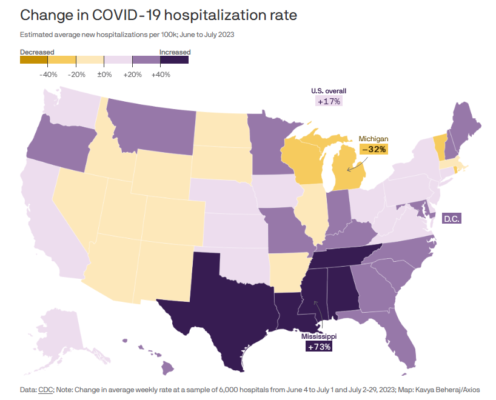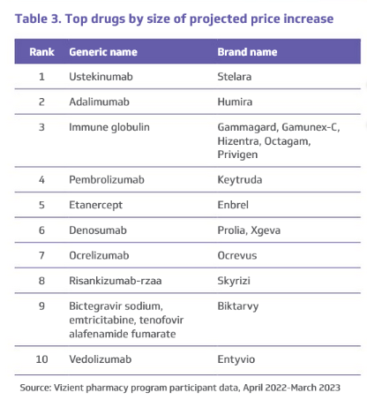August 18, 2023 ✒ Andrew Kantor
A lot of you don’t want to hear about what Amazon is doing in the pharmacy space, but we’re including this story for a specific reason. Amazon has enacted a feature to its pharmacy biz because it realize that patients really, really want it. In short, Amazon is automatically applying insulin co-pay coupons for patients, rather than having them try to figure out the mess themselves. Why a mess? Because while insulin makers said they would keep co-pays low, that doesn’t mean they made it easy. Despite Lilly lowering the list price of its Insulin Lispro to $25 per vial in May, patients were still being quoted as much as $330 for the medicine, were not being told about cheaper options when they went to pharmacies, and were finding it difficult to use Lilly’s savings program. The takeaway here is that there’s a lot of patient frustration around diabetes coupons and co-pays, and any way you can make it easier for patients is going to be appreciated. It’s a family affair at Mid-City Pharmacy in Canton, Georgia. AIP VP Jonathan Marquess, PharmD, and MSR Ashton Sullivan met with pharmacist, owner, and longtime AIP member Billy Cagle, RPh. With Billy Cagle are (l-r) AIP VP Jonathan Marquess, daughter Denise Haygood, CPhT; daughter Cynthia Sharp, PharmD; granddaughter Emily Zimmerman, PharmD; AIP Member Service Rep Ashton Sullivan. Sure, it was great to meet Billy and his staff — and to talk about strategies that could improve his bottom line, but Marquess had a special shout-out for his granddaughter: “A big congratulations to Emily who not only just graduated from the UGA College of Pharmacy but has already passed her boards!” No one wants to hear it, but the numbers don’t lie: Covid cases continue to tick up, and pandemic fatigue means we’re not doing a great job tracking it. Half-full glass: The numbers are still pretty small, especially compared to the last few years. Half-empty glass: Yeah, but wastewater analysis, case numbers, and hospitalizations are all pointing to another wave. Covid hits different parts of the country at different times, and right now the Southeast is where the numbers are rising. In Georgia, hospitalizations rose 32% from June to July, and with testing being spotty that might be the best indicator. The big concern is how well this year’s Covid booster (which targets Kracken, the XBB.1.5 variant) will fare against Eris (an offshoot of the XBB.1.9.2 variant). Eris already accounts for more than 17% of cases in the US, but it might be close enough to Kracken that the vaccine will work pretty well. The vaccine makers are testing their drugs, but it’s probably too late to change for this coming season. Health officials across the country are gearing up for the triple threat in what will soon be known as “Respiratory Virus Season*.” Yay. Flu and RSV shots are already available (or are about to be) and the updated Covid vax will be coming soon — hopefully you know this already. The trick will be getting the message to people to take their ounce (or cc) of prevention. * One official called it “pan-respiratory season,” which doesn’t have the same ring and is missing those capital letters. The morning-after pill — levonorgestrel — does a decent job preventing fertilization and thus pregnancy. But “decent” means only about 63% effective, so it could be better. How? By adding a bit of piroxicam, the arthritis drug. A new study out of Hong Kong and Sweden found that “Taking piroxicam […] at the same time as the morning-after pill levonorgestrel prevents 95% of pregnancies.” And there was no difference in side effects. Caveat: The study involved only Asian women who weighed less than 70 kg (154 lbs in Freedom Units). Why should human beings (or even our coming AI overlords) have to bother detecting colon cancer, when we can get bacteria to do it for us? Bioengineers at UC San Diego and in Australia have found a way to engineer bacteria (via CRISPR, in fact) to find a particular mutated form of a gene called KRAS that’s present in cancer. If a bacterium finds that mutated DNA, it lives; if it doesn’t, it dies. Thus the researchers only had to measure the levels of live bacteria to know if there was tumor DNA floating about. In other words, “The mice with tumors grew green bacterial colonies that had acquired the ability to grow on antibiotic plates.” Lots more research is needed, but they point out that engineering bacteria to detect cancer cells might also mean they can engineer those bacteria to attack them. Bacteria on kitchen sponges, toilet seats, and cell phones — that’s old news. The new hotbeds for pathogens are … rubber and plastic wristbands. Yep, whatever’s holding your FitBit or watch onto your arm might be a Petri dish ringworld. According to the tests done by Florida Atlantic University researchers… Staphylococcus was prevalent on 85 percent of the wristbands; researchers found Pseudomonas on 30 percent of the wristbands; and they found E. coli bacteria on 60 percent of the wristbands, which most commonly begins infection through fecal-oral transmission. Eew. What to do? Per those researchers, you want to “go for the gold”: “[R]ubber and plastic wristbands had higher bacterial counts, while metal ones, especially gold and silver, had little to no bacteria.” Fun fact: Scientists don’t know how GLP-1 drugs work to help people lose weight. They know the results, but the how is a mystery. Here’s a cool story about the discovery and confusion of the new crop of weight-loss drugs. What’s on your watchband, gearing up for Covid, improving Plan B, and more
Insulin: What you can learn from Amazon
AIP is on the move again

Here comes Covid
Numbers keep ticking up

Will the booster work against Eris?
States prepare
A better morning after
Tiny tumor detectors
Band of bothers
The Long Read: The GLP-1 Story — a Mystery
August 17, 2023 ✒ Andrew Kantor
For all the good the new weight loss drugs are doing for patients, take a moment to shed a tear for the victim in all this: SlimFast, which has seen its sales plunge 30% from 2022 to this year. The UGA College of Pharmacy brought 147 new students into the fold at this year’s White Coat Ceremony — which just so happened to feature GPhA Interim CEO Mahlon Davidson (UGA ’82). Welcome, one and all! Someone who low levels of vitamin K is more likely to suffer from asthma, COPD, or simply wheezing. That’s the conclusion from a group of those shifty Danes who studied 4,000 other shifty Danes, conducting tests of lung function and comparing them with participants’ vitamin K levels. Lower vitamin K was associated with lower lung function. Note the word associated; the authors pointed out that the study “only found an association between vitamin levels and lung function; it couldn’t prove cause and effect.” Still, they say, it’s a connection worth investigating. In the meantime, if you have trouble breathing, hit those leafy greens, vegetable oils, and whole-grain cereal. (Side note: Vitamin K again? Yep. Back in May we told you how vitamin K might protect against diabetes.) Medicare might be planning to cover Eisai’s new Alzheimer’s drug Leqembi (with restrictions), but private insurers are balking. It’s not just the $26,000 per year price tag (plus the cost of scans and repeat visits), it’s the dangerous side effects and the fact that even when it does work, the real-world effect isn’t huge. Or, as one insurer’s spokesperson put it, “the existing evidence does not allow for conclusions to be drawn about the safety and effectiveness of Leqembi.” Cancer drugs (Swedish researchers explained) are often approved based on lab tests — regulators want to get them to patients quickly. But when they looked at the real-world data, they found that a lot of those drugs don’t have much of an effect. “We have shown that the majority of the drugs launched with limited evidence still lack clear evidence of how they actually affect survival and quality of life in patients.” In fact, of the 22 drugs they checked, only 7 really worked (“the treatment either improved quality of life or increased life expectancy.” The other 15? “[R]andomized controlled trials failed to show any such effect, or there were no results from these trials.” When studies considers patients’ race, they might be painting with too broad a brush. Essentially, lumping Chinese, Indian, Japanese, and Korean people into the Asian category can hide important distinctions between the groups, say Cornell researchers. Ditto for, say, Black including people from Africa and the Caribbean, or White including Canadians and Russians. Often, there were greater differences among subgroups within the same race category than between the broad race categories themselves. The FDA is Not Happy at All with how AstraZeneca’s sales material represents its Breztri Aerosphere inhaler. It send the company a sternly worded letter. According to the FDA, the document includes the “prominent headline claim” about a difference in time to all-cause mortality between the Breztri and control cohorts in a chronic obstructive pulmonary disease (COPD) clinical trial. In fact, the agency says, there’s no data showing that Breztri had a positive impact on all-cause mortality. The company has 15 days to submit a “plan for discontinuing use of such communications, or for ceasing distribution of Breztri” or Steps Will Be Taken. Meanwhile, across the pond, the UK’s Prescription Medicines Code of Practice Authority (PMCPA) has accused Novartis of playing fast and loose with efficacy and safety claims of Entresto in a podcast aimed at heart failure specialist nurses. No, said the agency, there’s no evidence Entresto can increase energy levels as the company suggested. [T]he PMCPA determined that Novartis “reduced confidence in, and brought discredit upon, the industry.” This verdict amounted to a breach of the gravest nature, falling under Clause 2 of the ABPI Code, the most significant breach possible. Researchers at UC Berkley were able to recreate Pink Floyd’s “Another Brick in the Wall, Part 1” by monitoring the brain of a patient who underwent brain surgery, playing back the song based on the patient’s brainwaves. It suggests that in the future, a brain-computer interface wouldn’t have to sound like Stephen Hawking. No word on whether the patient also watched “The Wizard of Oz.”Pink Floyd from the brain, Ozempic’s big victim, why races are too broad, and more
A moment for the victims
Welcome, future GPhA members!

Behold your future coworkers
Vitamin K takes asthma away (maybe)
Insurers balk at Lemquebi’s price
Speaking of unclear benefits….
We need narrower racial categories
Warning! Warning!
FDA slaps AZ for misleading claims
Even podcasts aren’t immune to the long arm of the law
Crazy science story of the week
August 16, 2023 ✒ Andrew Kantor
If you’re getting a vaccine and a booster, does it matter which arm gets which shot? It seems no one bothered to ask that until a German doctoral student came along. And what she found was surprising. Yes, it does make a difference, and getting the vaccine and booster in the same arm is noticeably better. Or if you want to sound more like a medical professional, there were “indications that ipsilateral vaccination can definitely generate better protection than contralateral vaccination.” Most striking was the observation that two weeks after vaccination, the number of CD8 T cells, colloquially called “T killer cells”, was significantly higher in those who were “unilaterally” vaccinated in those who received their vaccination in both arms. But it gets a little weirder. While there were the same number of antibodies generated no matter which arm got what, once again using the same arm was better because “the antibodies in the ipsilaterally vaccinated people caught the spike protein of the virus more strongly.” Don’t be left out! There are still some tickets available for GPhA’s 2023 Day at the Braves on Sunday, September 10! Come see Atlanta take on the Pittsburgh Pirates and cheer them on with other Georgia pharmacy folks. More than 50 people have already signed up, so don’t wait to order yours! Our seat block is in the Terrace Reserved Section 240 and tickets are just $50 each. The game starts at 1:35 pm — a perfect way to end the summer! We wouldn’t use so many exclamation marks if we didn’t think it was great! GPhA’s seating has sold out fast these last two years, so don’t wait — order your tickets today! The FDA is telling, well, everyone not to use a bunch of pregnancy and ovulation tests made by Universal Meditech because they may not work and may not even be safe. The FDA doesn’t know. To complicate the whole thing, the tests are branded by a whole bunch of other companies, e.g., “HealthyWiser” and “PrestiBio.” So you want to check the full list. Not complicated enough for ya? How about this: The company is out of business “and is no longer providing support for its tests.” “Nestlé Recalls Chocolate Chip Cookie Dough After Wood Chips Found” The FDA has approved Akeega, the Janssen Pharmaceuticals combo of niraparib and abiraterone acetate, for treating BRCA-positive, metastatic castration-resistant prostate cancer in adult patients. If you want the details of the study, which includes bits like “(HR, 0.79; 95% CI, 0.55 – 1.12)”, click here. Otherwise you’ve got the gist. Drug makers have challenged the part of the Inflation Reduction Act that allows Medicare to negotiate a fair price on the most expensive drugs it pays for. They want taxpayers to pay whatever they (the pharma companies) feel like charging, and they’ve claimed it’s unconstitutional for the government to dare negotiate like some kind of … of capitalists. But after listening to the industry’s threats and doom-saying, HHS has had enough. It’s filed its response to the US Chamber of Commerce’s claims, pointing out that it hasn’t even selected the drugs it will negotiate over — “the Negotiation Program currently imposes no legal obligations on any drug manufacturer whatsoever.” And besides, the US Chamber of Commerce doesn’t even have standing to speak for the entire pharmaceutical industry. Here’s a side effect of the new weight loss drugs you might not have considered. Because they slow the digestive system to a crawl, GLP-1 inhibitors can screw with the timing when someone has to fast before, say, going under anesthesia. Some anesthesiologists […] say they’ve seen growing numbers of patients on the weight-loss drugs who inhaled food and liquid into their lungs while sedated because their stomachs were still full — even after following standard instructions to stop eating for six to eight hours in advance. There are plenty of stories of how long Covid is affecting people, from brain fog and muscle aches to being turned into a newt or smelling like elderberries. The latest gets into Smurf territory: A 33-year-old British man found that after experiencing Covid-19, his legs would start turning blue*. [T]he patient’s legs would turn bright red upon standing, but became more blue as time went on. After 10 minutes, the patient experienced itching sensations in his legs as well. Money quote: “Patients experiencing this […] may feel concerned about what they are seeing.” * Yes, technically it’s acrocyanosis, smarty pants. But that doesn’t make nearly as good a headline. Money quote regarding Vlad: “He was known to be a fierce defender of his land.”Smurf legs from long Covid, vaccination arm matters, Vlad’s bloody tears, and more
When it comes to vaccines, side matters

Bill is all set.
Why yes, there are still tickets for GPhA’s Day at the Braves!


Pregnancy tests that may not work

This image could apply to either recall story.
While we’re on the subject of recalls….
New prostate cancer drug approved
HHS fires back against drug makers
Unexpected side effects
… of weight loss drugs
… of long Covid
Non-pharma science headline that raises an eyebrow
August 12, 2023 ✒ Andrew Kantor
You don’t want type 2 diabetes, of course, but you definitely don’t want it for the long haul. Apparently it can literally change the structure of your brain. That’s what University of Michigan researchers found after doing tests — including MRI scans — on 51 people with type 2 diabetes. Brain imaging suggested that study participants with longer durations of type 2 diabetes had decreased mean cortical thickness and gray matter volumes, and an increased volume of white matter hyperintensities. The good news is that even though they saw those physical changes in the brain, the participants’ cognition wasn’t affected. Still, they said, the fact that the brain is affected suggests that diabetics might need to be screened early and often for cognitive disorders. Three more cancer drugs are now in shortage per the FDA: decitabine injection* (50 mg solution), doxorubicin liposomal injection, and methotrexate tablets. That is all. * “Hospitals are recommended to evaluate current supply and consider alternative regimens for a drug that lacks a replacement agent.” Even after Covid-19 has left the lungs, it’s still causing “mitochondrial dysfunction” in other organs including the heart, kidneys, and liver. That, say researchers at Children’s Hospital of Philadelphia, could be the cause of long Covid. [O]ver time, mitochondrial function in the lungs is restored, while in other organs, particularly the heart, mitochondrial function remains impaired. Their conclusion: “[W]e need to stop looking at Covid-19 as strictly an upper respiratory disease and start viewing it as a systemic disorder that impacts multiple organs.” So the AARP looked at the prices of the top 25 drugs Medicare Part D’s money goes to. In a shock to no one, pharma companies have jacked up those prices over and over — in all but one case (Trelegy Ellipta) well above the rate of inflation. Our analysis found that list prices for the top 25 drugs have increased by an average of 226 percent—or more than tripled—since they first entered the market. These lifetime price increases ranged from 20 percent to 739 percent. In other words, the drug makers didn’t just introduce these drugs at a high price, they continued to raise and raise and raise those prices … because they could. And thanks to math the longer a drug is on the market, the higher the price goes, even relative to inflation. Oh, and as far as that long-disproven argument about recouping R&D costs? No clear rationale exists for prescription drug price increases given that launch prices ostensibly reflect the costs associated with developing the drug and future research costs. “These findings,” the organization writes, “highlight the importance of the Inflation Reduction Act and its inflation-based rebates that will require drug companies to pay Medicare when they increase their prices faster than inflation.” Here’s one of those odd twists: If you give a mouse melanoma, you might also want to give it ranolazine, the heart medication. Why? Apparently it can improve the efficacy of melanoma treatments. Spanish researchers, looking at how tumors can develop resistance to standard melanoma therapies, found that, among other things, ranolazine “increases the visibility of melanoma cells to the immune system, thereby improving response to immunotherapies and increasing the ability of lymphocytes to control tumour growth.” The Sackler family had won a concession — part of the big Purdue/Oxycontin deal — that the family itself would be shielded from liability. The Justice Department didn’t like that, and now the Supreme Court has sorta-kinda ruled in its favor, a hold on the deal until it can review it, with arguments starting in December. More drugs in shortage, diabetes shrinks your brain, surprise melanoma-treatment boost, and more
This is your brain on diabetes
Drug shortages continue
Systemic Covid
What the (drug) traffic will bear
Heart med boosts melanoma treatment
ICYMI: SCOTUS nixes Purdue Pharma deal
August 11, 2023 ✒ Andrew Kantor
Sayeth GPhA President Joe Ed Holt: Mahlon has an extensive history with GPhA, serving with class and style on just about every committee and as association president from 2021 to 2022. There are not many people out there who love GPhA as much as Mahlon. He will do a great job! Long-term use of proton pump inhibitors (PPIs) for acid reflux could raise your (or your patients’) risk of diabetes. That’s the conclusion of Chinese researchers who looked at the medical records of more than 200,000 American and British patients and 10,000 cases of diabetes over an average of 9 to 12 years. And the longer these drugs are taken, the greater the risk seems to be, the findings show, prompting the researchers to advise that people taking these drugs for 2 or more years should have regular blood glucose check-ups to screen for diabetes. Add to that the fact that “Long-term use [of PPIs] has been linked to an increased risk of bone fractures, chronic kidney disease, gut infections and, stomach cancer,” and you might want to have a conversation with some of your patients. You might remember earlier this year when the DEA was planning to go back to pre-pandemic rules about C-II prescriptions. No more telehealth without an in-person visit, for example. It got a ton of pushback considering how much good the relaxed rules had done. In May the agency relented … but still held out the possibility of script tightening. The latest twist: The DEA now says it’s open to creating a special registration process for telehealth providers that would not require an in-person exam. It’s holding an open listening session on September 12 and 13 to hear what folks have to say. Next on AIP’s “DIR Hangover Preparation Tour” was Taylorsville Pharmacy in Taylorsville, where AIP VP Jonathan Marquess and MSR Ashton Sullivan met pharmacist/owner Dawn Collier. “A big thanks to Dawn for meeting with us and discussing some of the challenges independent pharmacies in Georgia face,” Marquess said. “We were glad to provide you with some AIP partners to help!” Duke researchers have developed a new synthetic antibiotic they call LPC-233 that targets gram-negative bacteria like salmonella and E. coli. “LPC-233,” they say, “can reduce bacterial viability by 100,000-fold within four hours.” The compound is also tenacious enough to survive all the way to the urinary tract after oral administration, which may make it a vital tool against stubborn urinary tract infections. They’re so sure it will work like the Dickens they’ve not only taken out a bunch of patents, they’ve launched a startup — even though it’s only been tested on animals. New, big, international research seems to point to variations of a single gene — called FOXP4 — that can determine if someone is likely to develop long Covid. The new study looked at DNA from 6,450 people who developed long COVID and compared it to the DNA of those who did not. […] When that data was analyzed, only one connection between a person’s genes and whether they developed long COVID stood out — the FOXP4 gene. It’s not a 1:1 correlation; having a particular variant of FOXP4 doesn’t mean you will get long Covid, just that your odds increase. Nor is the gene directly responsible. It has a lot of effects in the lungs, so more likely the correlation has uncovered “some underlying immune dysregulation in the lung itself.” Still, just finding the connection is a major step toward helping the more than 40 million people worldwide dealing with Covid long after dealing with Covid. What controls the balance of vitamins in the body? If you said, “I’m not sure” or “Some organs or something, probably,” you’re with the majority of scientists. But Scottish researchers made a pretty big discovery: It’s the brain that regulates vitamin A — specifically the hypothalamus. That’s a Big Deal because it suggests that vitamin A imbalance might not be caused simply by vitamin A deficiency — it might be “an abnormality in hypothalamic function due to disease or inflammation.” Oh, and the other way around, too: “Diseases that effect the hypothalamus may have some of their symptoms due to disordered vitamin A levels.” Healthcare analytics company Vizient predicts that hospitals will spend an average of 3.4% more for drugs next year, but not for all drugs. The biggest drivers, the company projects, with be “specialty pharmaceuticals and medications in the neurology service line.” Specifically they’re talking about Humira, Stelara, Prolia/Xgeva, Teclistimab, and Kimmtrak. On the neurology side they’re expecting Ocrevus and and CGRP-therapy drugs for treating migraine to see the biggest price hikes. And of course there are various forms of semaglutide, although here at Buzz HQ we’re not sure how that would be used in a hospital setting. Instead of using a CPAP to essentially force air into the lungs of someone with sleep apnea, why not relax the appropriate muscles to keep the airways open? And we already have the technology to do just that (thought British researchers): transcutaneous electrical stimulation or TENS. Yep, good ol’ TENS machines, helping people with muscle issues for years, might be a much less invasive treatment for sleep apnea. The light and continuous electric stimulation of the TENS machine is enough to keep the airway open while asleep, allowing easy breathing to continue. Patients treated with TENS showed improvements in nocturnal breathing and a significant reduction of daytime exhaustion. Long Covid gene discovered, diabetes danger from PPIs, DEA moves on telehealth, and more
Mahlon Davidson named GPhA interim CEO
 While the search for a permanent association CEO continues, the GPhA Board of Directors offered the position of interim CEO to past president Mahlon Davidson, who graciously accepted.
While the search for a permanent association CEO continues, the GPhA Board of Directors offered the position of interim CEO to past president Mahlon Davidson, who graciously accepted.PPIs and diabetes
DEA considers telehealth registry program

AIP is on the move

New drug, new company
Long Covid: could one gene be the issue?
Vitamins on your mind
Following next year’s Benjamins

Non-pharma, cool treatment story of the week
August 10, 2023 ✒ Andrew Kantor
Good news for people with depression or anxiety: For all the bad things it can do to your body, at least it won’t increase your cancer risk. That hasn’t always been clear. Some studies suggested a risk, others didn’t, so Dutch researchers decided to do a big ol’ meta-analysis of the data. By big we mean data from “18 prospective study groups with more than 300,000 adults from the Netherlands, the United Kingdom, Norway, and Canada.” The team found no associations between depression or anxiety and overall, breast, prostate, colorectal, and alcohol-related cancers during a follow-up of up to 26 years. (There was a slight increased risk of lung cancer, but that all but disappeared when they adjusted for other risk factors.) And there you have it … until the next study. …and that means it’s time for the AIP staff to hit the streets and listen to our members. AIP VP Jonathan Marquess and MSR Ashton Sullivan met with longtime friend and GPhA Bowl of Hygeia winner Ben Flannagan, RPh, at Lacey Drug in Acworth, GA. “It was great that Ben took a few minutes to talk with us — and ditto for his terrific staff!” Most people carry the Epstein-Barr virus, which is usually benign. Sometimes, though, it acts up and leads to serious conditions like mononucleosis, some cancers, and notably multiple sclerosis. Because of the way the Epstein-Barr virus hides in B cells, the body relies heavily on killer T cells to attack it rather than antibodies. If a vaccine is going to work, it’s those T cells it’ll need to train. And what do you know, scientists at Australia’s QIMR Berghofer Medical Research Institute think they’ve done just that: created a vaccine against Epstein-Barr — one that “induces that killer T cell immune response as well as the neutralising antibody immune response.” The big downside: This was a preclinical finding, so it’ll be a while before we start talking about an MS vaccine. It’s almost time to render unto Mary that which is Mary’s. (Meaning Mary Ritchie, GPhA’s director of membership.) Your GPhA 2023–24 dues invoice will be coming to your mailbox next week, so keep an eye out. And please, if you would be so kind as to send it back quickly, it’ll make Mary’s life a bit easier. Thank you! Imagine a class with a Kaylee, Kayleigh, Kayley, and a Kaylie, and maybe a Hayley and Hayleigh to boot. Now imagine those are drugs … and patient’s lives are on the line. Thus you see why the Institute for Safe Medication Practices maintains a list of drug-name pairs that are easy to confuse — a list it just updated for the first time in four (for, fore) years with 80 new entries. Older drugs like cefazolin and cefotetan have been confusing since the 1980s, and it’s even worse now with more drugs in their class, not to mention long-acting and high-dose versions of drugs or vaccines. What’s to be done? There’s “tall man lettering” — using case and boldface to differentiate drugs (e.g., vinBLAStine and vinCRIStine). There’s writing the indication. And of course there’s e-prescribing … although with drop-down menus it’s still possible to make an error when, say, hydrochlorothiazide is right above hydroxychloroquine. And there’s always the age-old practice of double- and triple-checking. The latest data from the Walgreens Covid-19 index shows that test-positivity is starting to rise in a bunch of states; it’s now at 44.7% nationwide, the highest percentage since May 2022. Georgia saw its rate jump 9% in the past week. [insert foreboding music here] “Young people are more likely to fall while texting and walking” Women get migraines more than men — a lot more. Why is that? There are a lot of factors in play, explains a neurologist at the University of Colorado. There are several factors […] These include hormones, genetics, how certain genes are activated or deactivated — an area of study called epigenetics — and the environment. All of these factors play a role in shaping the structure, function and adaptability of the brain when it comes to migraines.Drug-name confusion, why migraines are sexist, good news for the depressed, and more
Cancer might lead to depression, but not the other way around
School’s back in session…

A step toward an Epstein–Barr vaccine
Dues renewal is nigh!
Confusing drug names: They’re updating their list (over there)

Is this clonazepam or lorazepam?
Covid continues to tick up
Captain Obvious enjoys seeing the world

The Long Read: Sexist Migraines edition
August 09, 2023 ✒ Andrew Kantor
A new study released by Novo Nordisk shows that Wegovy isn’t just a weight loss drug. It can also reduce the incidence of cardiovascular events. Novo said the eagerly-awaited study results, which have not been peer reviewed, showed that patients on Wegovy had a 20% lower incidence of heart attack, stroke or death from heart disease compared to those on a placebo. That’s a big deal because, if it pans out, it could change CMS’s classification of Wegovy from a lifestyle drug to a real drug, eligible for that sweet, sweet Medicare and -caid funding. (In fact, as we reported a few days ago, it might be a lot more cost effective to cover weight loss drugs than to pay to treat the conditions it brings.) With weight loss drugs firmly in the mainstream, the latest folks hopping on the This Can Help My Patients bandwagon are psychiatrists. That’s not just because being overweight has psychological issues, but because many of the meds they prescribe — especially antipsychotics and mood stabilizers — can lead to weight gain. Add to this that patients with depression or anxiety might not be willing or able to exercise as much as they should. As one psychiatrist put it, “It’s been a real welcome addition […] for people who truly have endured significant weight gain because of atypical antipsychotics and have doggedly tried their best to overcome that.” Because that includes Panama, and there’s a big ol’ canal there. With a major drought like the one going on there today, there’s not enough water to “lift” ships through the canal*. That means the Panama Canal Authority is starting to put limits on the size of ships it’ll allow though. And that means potential supply disruptions for cargo from Asia — like pharmaceuticals. And with El Niño coming down the pike — and the lower rainfall it brings — it may get worse. * Fun fact: “Every vessel that moves through the canal requires approximately 52 million gallons of water.” Yesterday we told you about the approval of zuranolone, the first pill to treat postpartum depression. But now there’s a pricing wrinkle. Sage Therapeutics had hoped the drug would also be approved for treating major depressive disorder, but it wasn’t. There are a lot more MDD patients than postpartum patients out there, so the ruling means a lot less money for the company — so it will likely setting a higher price for the drug to keep investors happy. [C]ompany officials said they are “committed” to ensuring the drug remains accessible. But they also said a variety of factors will affect how zuranolone is priced in the absence of the MDD indication and its much larger patient population. In the latest flake of fallout from the Rocky Mount, NC, tornado continues, Pfizer said it’s limiting access to some injectables to emergency orders only. Pfizer’s list includes injections for dextrose, sodium chloride, and the heart failure medication dobutamine — these can only be ordered via direct shipment from the company or its representatives until further notice. Remember, these days any disagreement is a battle or a fight*, like the current one between the EPA and the FDA. The EPA wants to limit people’s exposure to ethylene oxide — a chemical used in sterilization facilities and chemical plants. It’s a known carcinogen and it’s affecting people around the plants where it’s used. But the FDA is concerned that EPA’s proposal — which will affect the plants that sterilize half of all medical devices in the U.S. — will put yet another crimp in the supply chain if it’s enacted too quickly. And so … they’re working together to sort it out so residents can be protected and the medical-device supply chain sees as little disruption as possible. In other words, they’re doing their jobs. * Kids: In the Long Long Ago, people could disagree about something and the world would assume, correctly, that they’d simply work it out like adults. There’s a new Covid-19 strain/variant/sub-variant/whatever making a name for itself: Eris*. It’s from the XBB lineage, so it should be covered by this fall’s boosters. It seems to be slightly more virulent than the last subvariant, but really is of most interest to people who like to track the virus like a fantasy football team. * Technically EG.5.1 or XBB.1.9.2.5.1. It goes Covid-19 → Omicron → B.1.1.529 → XBB → XBB.1.9 aka Hyperion → Eris. I think. Veterinarians on Cyprus have been given access to the government’s stockpile of human Covid-19 medication to be used on the island’s cats, which are facing an outbreak of feline infectious peritonitis (FIP) — a deadly disease, but one that can’t be transmitted to humans. It’s killed about 8,000 cats so far, but molnupiravir can prevent although the virus is unrelated to Covid. The government said the stockpile (for humans) won’t be compromised by giving the pills to cats.Dry Panama dangers, government battle that isn’t, why Wegovy is celebrating, and more
Wegovy for the heart
Speaking of Wegovy…
Why you should care about a drought in Central America
Post-partum pill pricing
Pfizer limits some orders
This is called “government working”
A couple of Covid updates
Meet “Eris”
Elsewhere: Cyprus Cats edition

August 08, 2023 ✒ Andrew Kantor
For the first time, there’s an FDA-approved pill to treat post-partum depression. Sure, antidepressants are a dime a dozen, but what makes zuranolone notable is that it works quickly and only needs to be taken for two weeks. (In fact, testing zuranolone as a treatment for major depressive disorder found that the effect wears off.) Like the IV drug brexanolone, zuranolone helps regulate the GABA-A receptor, but it’s a simple pill without brexanolone’s side effects or need for a 3-day infusion. (Why yes, someone did call it a “game-changer.”) When mom-to-be is at risk of a preterm birth, steroids are the answer. The trouble is, we might not be asking all the right questions. Sure, McMaster University researchers found, 40% of those babies go full term. But the downside is that they might have have a bunch of other issues “including neonatal intensive care admission, respiratory and growth issues, and adverse neurodevelopmental outcome.” In other words, better assessments need to be done before considering steroids. For infants born very prematurely, antenatal steroids potentially save lives and reduce severe morbidity but as pregnancy progresses to term, the benefits shift to risks. The CDC is now recommending the RSV vaccine — nirsevimab, Beyfortus to its friends — “for all infants under 8 months and some older babies at increased risk of severe illness caused by respiratory syncytial virus (RSV).” This comes just days after its Advisory Committee on Immunization Practices voted unanimously for that recommendation. “RSV,” the CDC reminds parents, “is the leading cause of hospitalizations for infants and older babies at higher risk.” Not just from smoking — from cracking open the containers and drinking the liquid nicotine inside. Cases of vaping-related nicotine exposure reported to poison centers hit an all-time high in 2022 — despite a 2016 law, the Child Nicotine Poisoning Prevention Act, that requires child-resistant packaging on bottles of vaping liquid. In what doctors call a major oversight, the law doesn’t require protective packaging on devices themselves. So kids are prying open the cartridges and drinking the nicotine, which may be candy- or fruit-flavored. Oh, and besides nicotine there’s arsenic, lead, acetaldehyde, formaldehyde, and benzene in it. And they’re drinking it. Fun fact: “Nearly 90% of exposures involved children under 5.” Good (?) news: “Fortunately, when kids do ingest these e-cig nicotine products, they self-decontaminate. They vomit — a lot — and this keeps the mortality rate very low, but these kids still often end up in emergency departments. Sometimes bad choices take a while to come home to roost. Take anti-vaxxers, who first appeared en masse back in the late ’90s. Well now those unvaccinated kids are in their 20s, and guess what? “[T]he reality of measles as a disease that strikes almost uniquely in childhood is changing.” There is […] a growing body of adults in this country who have no immunity against measles, experts say. In fact, since the year 2000, about 40% of measles cases in the U.S. have been in adults, with about one-quarter in people aged 20 to 29. The good news: The number of Americans without health insurance hit its lowest level ever earlier this year. The bad news: This was before states started removing people from the Medicaid rolls. “Medicaid disenrollments that accompanied the end of the Covid-19 public health emergency could quickly throw that trend in reverse.” Chemists are going beyond manipulating molecules to a level almost unthinkable a few years ago: not only manipulating individual atoms, but doing so at scale. Called skeletal editing, it’s to chemistry what CRISPR is to biology — with drugs instead of genes. Skeletal editing could help to speed up drug discovery dramatically, and chemists […] have now developed reactions that can insert single nitrogen and oxygen atoms into the central rings of some molecules, sidestepping the need to start from scratch. “It will increase the speed at which we can make things, and it will increase the diversity of products we can make.”Anti-vaxxed kids come of age, when vapes aren’t vaped, postpartum pill, and more
Postpartum depression gets a pill
Steroids for infants: a “doubled-edged sword”
RSV shot approved
Vapes are sending kids to hospital
What comes around…
Uninsured rate: one step forward, but headwinds await
The Long Read: Atomic Engineering edition
August 05, 2023 ✒ Andrew Kantor
Instead of attacking the proteins on the shells of viruses — proteins that tend to evolve pretty quickly — why not just skip past those and burst the viruses’ bubbles, literally? That’s the plan over at NYU. The idea is that the immune system doesn’t target a virus’s surface proteins — it goes after the virus particles themselves via their membranes. And it turns out that virus membranes contain a lipid called phosphatidylserine on the outside, where human cells have phosphatidylserine on the inside. You see where this is going: Phosphatidylserine is a handy target. So the NYUians tested some artificial peptides called peptoids* against some big-name viruses like Zika, Rift Valley fever, and chikungunya. And — Bam! — they cut through the viruses’ shells and destroyed the little buggers. In the lab, anyway. Their peptoid-focused approach may hold promise for treating a wide range of viruses with membranes that can be difficult to treat, including Ebola, SARS-CoV-2, and herpes. * The real ones break down too easily. Which of the two Covid mRNA vaccines is better and safer for older folks? Brown University researchers decided to find out. The answer is … Moderna’s. It was about 15% better at preventing Covid-19 infection, and had “a slightly lower risk of adverse events than the Pfizer-BioNTech vaccine.” Of course the dangers from getting Covid itself are far greater than either vaccine’s potential side effects. The fact that losing your sense of smell is an indication of declining cognitive function isn’t news. But UC Irvine neurobiologists decided to see if they could flip that idea. They exposed sleeping older people (with their consent) to various scents* via aromatherapy diffusers to see if that would affect their mental acuity. There were seven different scents involved, used individually for two hours each night over 6 months. Then they tested the subjects. And what d’ya know: People in the enriched group showed a 226% increase in cognitive performance compared to the control group […] Imaging revealed better integrity in the brain pathway called the left uncinate fasciculus…. Note for cynics: The study was supported by Proctor & Gamble, and “A product based on their study and designed for people to use at home is expected to come onto the market this fall.” * Rose, orange, eucalyptus, lemon, peppermint, rosemary, and lavender Most people know that GLP-1 inhibitors can have some significant gastrointestinal side effects. But “most people” apparently doesn’t include at least one woman in Louisiana. She’s suing Eli Lilly and Novo Nordisk. The lawsuit claims that [she] has suffered from “severe vomiting, stomach pain, gastrointestinal burning,” and has been hospitalized for stomach issues on “several” occasions. The drugs’ labels warn about ‘gastrointestinal adverse reactions,’ but she says they weren’t specific enough and now she wants “damages for past and future pain and suffering [and] medical costs along with attorney fees and court costs.” Belgian researchers are testing a different way to tackle cancer. Rather than simply trying to kill the tumor, they’re trying to prevent it from metastasizing — that, after all, is what eventually causes most cancer deaths. If you want some big words, here you go: They’re targeting the epithelial-to-mesenchymal transition process that cancer cells use to form metastases, and they’ve created the first drug to do that. What’s even better about the drug, called NP137, is that it’s not only been tested on mice, but human trials have started with positive results. Researchers at Los Angeles’s City of Hope cancer center say they’ve developed a drug that targets a protein in solid tumors called proliferating cell nuclear antigen (PCNA). What’s special about PCNA is that a mutated form of it “is critical in DNA replication and repair of all expanding tumors.” In other words, the mutated PCNA is unique to tumors, making it a great target. That in mind, they’ve “developed a targeted chemotherapy that appears to annihilate all solid tumors in preclinical research” while leaving normal cells alone. And even if it doesn’t work 100%, it can make cancer cells more susceptible to chemotherapy. “Our cancer-killing pill is like a snowstorm that closes a key airline hub, shutting down all flights in and out only in planes carrying cancer cells.” They’ve already begun phase 1 human trials. Yikes: “Investigations suggest that, in some fields, at least one-quarter of clinical trials might be problematic or even entirely made up.”Weight-loss lawsuit, the better mRNA vax, new cancer and virus targets, and more
Bursting viruses’ bubbles
Pfizer-Moderna mRNA cage match
Smells against cognitive decline
Someone didn’t get the message
Two new cancer targets
Targeting cancer’s spread

Attacking solid tumors
The Long Read: Don’t Trust, Do Verify edition
August 04, 2023 ✒ Andrew Kantor
Lupin Pharma has recalled two lots of its Tydemy birth control tablets because “one lot tested low for ascorbic acid (an inactive ingredient) and high for a known impurity.” The affected lots (L200183 and L201560) were distributed in the U.S. from June 3, 2022, to May 31, 2023. The company says it hasn’t received any reports of adverse events … yet. Droopy faces, the “Ozempic burp”, and now the newest GLP-1 drug side effect: stomach paralysis. If food is taking too long to leave the stomach, due to a condition called gastroparesis, it can harden into masses called bezoars* […] These can lead to blockages in the intestine and other issues. Good news: It’s a fairly rare side effect. Bad news: It can continue even after stopping the drug. A new trial by Eli Lilly found that its tirzepatide drug, Mounjaro, was much more effective than semaglutide drugs like Ozempic for losing weight — we’re talking 26.6% vs 15%. But wait — there’s a big caveat: It’s worth noting that patients on the SURMOUNT-3 [tirzepatide] trial also underwent an intensive lifestyle intervention that included a low calorie diet, exercise, and weekly counseling sessions. * Honestly, a Jeff Bezos joke here would be too easy. First: The Pfizer plant hit by a tornado will mean major drug shortages, especially of sterile injections. Then: No no, it was just the warehouse; the manufacturing part will be up and running tout suite. But then: Yeah, Pfizer says there are gonna be shortages after all. And now: “Most drugs made at tornado-ravaged Pfizer plant available from other suppliers, experts say.” Since 2006, Medicare, by law, can’t cover weight loss drugs — Congress was concerned about the cost. But with new and effective drugs on the market, USC researchers found that it’s more cost-effective to cover Mounjaro, Ozempic, and their kin than to treat obese patients. All told, in the first 10 years alone, Medicare coverage of weight-loss therapies would save the program $175 billion to $245 billion, depending on whether private insurance also covers the treatments. Over 60% of these savings would accrue to Medicare Part A by reducing hospital inpatient care demands and the demand for skilled nursing care. On the other hand is Eisai’s Alzheimer’s drug Leqembi, which Medicare will cover (with restrictions); Eisai is charging Medicare $26,500 per year per patient. But wait, there’s more. Due to the dangers of the drug, patients need tests, brain scans, and safety monitoring, so Leqembi will ultimately cost taxpayers $82,500 per patient per year. “But,” as one researcher put it, “the actual practical benefits to patients are very marginal, and there is a real risk and a real cost.” That “real cost” will be borne not just by taxpayers but by Medicare beneficiaries, who’ve already seen premiums go up 15% just in anticipation of these new drugs, not to mention co-pays. (So what is a reasonable price? The Institute for Clinical and Economic Review “suggested that Leqembi could be cost-effective at an annual price of $8,900 to $21,500.”) Rhinotillexis is a risk factor for Covid-19 and other respiratory infections. In other words, picking your nose (say Dutch researchers) increases healthcare workers’ chances of getting sick. After taking into account whether the participants had had close contact with someone with Covid or worked directly with Covid patients […] those who picked their noses were found to have almost a three times greater risk of developing a Covid infection than those who did not. The more you know. Continuing the theme of (not) sticking things in your nose, soon you might be able to skip those nasal swabs and the 15-minute wait for a Covid test result. A device developed at Washington University uses a simple breath sensor and gives results in less than a minute. [The researchers] said the breath test could be modified to simultaneously detect other viruses, including influenza and respiratory syncytial virus. They also believe they can develop a biodetector for any newly emerging pathogen within two weeks of receiving samples of it.Nose-picking dangers, GLP-1 stomach paralysis, spinning tornado info, and more
Birth control recall
More Ozempic side effects
By the way…
Tornado aftermath: It’s almost as if they aren’t sure
Tales of two drug costs
Weight loss drugs: An ounce of prevention

Alzheimer’s drugs: High cost, little benefit
When it comes to Covid, don’t be picky
Covid breath test


